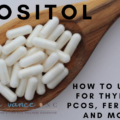Collagen has become a trendy fountain of youth supplement recently, touted for its benefits for skin, hair, joints, and nails. Should you use collagen? Read all about collagen’s benefits and everything you need to know!
Years ago when we started hearing about supplementing with collagen and its cousin gelatin, I was intrigued by the purported benefits ranging from healing leaky gut to improvements in joint health to wrinkle free skin and long, strong hair. I started adding gelatin to smoothies and making treats out of it, like this strawberry pudding. But I didn’t see a ton of benefit (more on that later).
Fast forward to the present wherein we have access to some pretty wonderful collagen products that do, in fact, support joint, skin, gut, and hair health. But navigating all the different options out there is confusing. And how do you know collagen is right for you? Most importantly, does it work?
What is Collagen?
Collagen is the most plentiful protein in the body, the raw material that is needed to build skin, bones, connective tissue. As a protein, collagen contains the amino acids needed for structural repair in the body. The sad news is that collagen production starts to decline at a rate of about 1 percent a year starting around age 20. By age 40, most people will have lost between 10% and 20% of their collagen levels, and that contributes to thinning hair, creaky joints, and saggy skin.
You’ve probably heard of gelatin, which is formed from the tendons, ligaments, and bones of animals. Collagen or collagen peptides is simply gelatin that has been more hydrolyzed to form smaller proteins, which are more easily digested and absorbed by the body (gelatin is a large protein). So, collagen is easier to absorb and may work better for some people (which may have been why I didn’t notice a huge benefit from using gelatin).
Gelatin is a thickener and gels whatever it’s added to (think jello). That’s why you always see it in recipes for gut healing gummy snacks, mousses, and puddings. Collagen is easily dissolved in water and can be added to liquids without thickening them. Though gelatin and collagen have the same benefits, I think collagen works better because it’s more readily absorbed. Read more about collagen vs gelatin here.
The peptides in collagen powders are made up of amino acids, the building blocks of proteins. There are an estimated 20 to 22 amino acids that make up every protein in the human body, but collagen is not a complete protein; it’s low in or does not contain all 9 of the essential amino acids. It’s still a great protein source, however.
Collagen Benefits
I guinea pig myself with every supplement I recommend, and I’ve been taking this collagen supplement for about a month now, daily more or less. I have noticed a HUGE benefit in my skin, hair, and nails. I sometimes mix it with this collagen-based formula specifically designed to support joints, skin, and hair to pack an even bigger punch. See this post for my daily collagen recipe.
UPDATE: I’ve been using collagen on and off (mostly on) for a few years now and continue to see huge improvement in skin, hair, and joints. Read this post to see how collagen helped me regrow my hair after I experienced hair loss.
1) Perhaps my favorite benefit I’ve noticed is indeed improved skin texture and better hair, especially when I mix it with the supplement I mentioned above. I’ve struggled with hair loss in the past, and I can tell a big difference in my hair quality. Supposedly collagen thickens the hair follicles, so hair has a thicker texture. (source) Collagen also provides the amino acids your body needs to make keratin, the material hair is made of. It’s worth noting, however, that hair loss can have many causes, so please determine what’s causing your hair to shed rather than just picking collagen as a quick fix (though it does make an excellent addition to any hair strengthening protocol).
My nails grow so fast, and my skin looks better too, like it’s retaining better moisture, which is sorely needed for high altitude living up here in the mountains. Collagen decreases wrinkles, improves skin elasticity, and strengthens skin cells. Studies show taking collagen improves skin’s hydration and elasticity. (source) It works! It may also prevent skin sagging and fine lines. It is also said to reduce cellulite, but I haven’t seen evidence of that.
2) It’s fantastic for repairing leaky gut. Did you know the cells in your gut lining have a high need for the amino acids that collagen provides? Collagen supports healing and repair of damaged intestinal tissue, providing the nutrients and raw materials the intestinal lining needs. Collagen is an excellent support to a gut healing protocol and is highly recommended for anyone with IBS, IBD, or reflux/GERD.
3) Improvement in joint mobility. This was the other major and very fast benefit I noticed. I’ve had runner’s knee in both knees for a couple years now, and it flares on and off. Super annoying, and it gets much worse during ski season. Happy to report that I had absolutely zero knee pain this past winter, and I’ve been able to keep up with my running, too. Collagen supports tendon and ligament health and also nourishes bones. Researchers are finding that collagen is excellent in treating both osteo and rheumatoid arthritis. (source)
4) Detox and weight loss. Collagen is very rich in glycine, a precursor to glutathione, which is the most important antioxidant for liver detox. So collagen can support the liver’s detox pathways. And glycine may also boost metabolism.
5) Collagen is a great source of protein. You can get up to 20 grams of protein in certain collagen supplements.
6) Collagen can support healthy cardio function and may help lower high blood pressure. (source) Proline, an amino acid found in collagen, may help get rid of fat deposits in the arteries and repair tissue within the arteries.
7) Contributes to muscle growth because the amino acids in collagen support muscle mass.
Types of Collagen
There are over 20 different types of collagen inside your body, but types I, II, III make up 80-90 percent. Type I is the most abundant in the body; type II makes up cartilage; and type III is a major component of the extracellular matrix in a variety of internal organs and skin.
You can get collagen proteins from fish, beef, chicken, or pig. There is no vegetarian source of collagen available (because duh, it comes from the connective tissue of animals), though you will see “vegan” collagen on the market. That’s not in any way a true collagen. Bovine (beef) collagen contains types I & III and is best for skin, hair, joints, and gut health. (source) Marine collagen is type I and works best for skin and beauty. Type II makes up a major portion of the cartilage that cushions joints and is primarily found in chicken collagen. Type II will give you the best joint and cartilage support, but types I and III also support tendons and ligaments.
I’ve also read in my research that types I, II, and III are just “marketing ploys” and you can reap the benefits from any properly sourced collagen. (source) However, in my experience (anecdotal), collagens with mixed types work best. This one is the best I’ve tried (mixed types). Marine collagen would be just fine if you are pescatarian.
Sourcing Collagen
Sourcing collagen properly is super important. Always make sure your collagen is grass fed or organic and hormone free. I’ve done the most research on collagen peptides and have used two products that I absolutely trust and recommend. I can’t vouch for others, but like any supplement, there are a lot of bogus ones out there to watch out for. I use this Whole Body collagen primarily, which is by far the best I’ve tried in terms of noticeable results, and this hair-skin-joint collagen formula (contains other nutrients to support hair, skin, joints, and nails). Vital Proteins is another good brand but not as good as Whole Body.
I always take the powder form over swallowing the capsules because you can easily mix them with liquid, and they’re absorbed more quickly. Also you have to swallow a lot of the capsules to get the proper dosage. Click here to get my daily collagen “recipe.” You can mix it in with coffee, eat, or even lemon water. It dissolves instantly and is flavorless.
Should You Take Collagen?
If you’re older than 25, you can reap collagen’s anti-aging benefits. If you have autoimmune disease, thinning hair, joint pain, or aging skin, you can’t go wrong. And I almost always recommend collagen peptides to those healing leaky gut.
How much collagen should you take? You need a minimum of 5 grams per day to see any result. This one I’ve been taking clocks in at about 12 grams per serving. You could easily double that for more therapeutic benefit if needed. You should start to notice benefits in a month or so.
You can take up to 20-30 grams per day. 15-20 grams is a good therapeutic dose for joints, skin, and leaky gut. The top end, 30 grams, is really only needed by those who work out a lot and are trying to build muscle. I recommend this collagen which you can easily mix into smoothies or drinks for a higher dose.
Can I just drink bone broth? Well, yes, of course. Bone broth is rich in collagen, gelatin, and amino acids, but you’d have to drink a truckload to get the same benefits. I use and love bone broth for its many health benefits, but it just doesn’t contain the amount of collagen you need to get a therapeutic dose (AKA a dose that works).
Bottom line: collagen rarely has side effects and can benefit anyone looking for improved skin, hair, joint, and gut health. Think I’ll have some right now.
Pin it!

Mary Vance is a Certified Nutrition Consultant and author specializing in digestive health. She combines a science-based approach with natural therapies to rebalance the body. In addition to her 1:1 coaching, she offers courses to help you heal your gut and improve your health. Mary lives in San Francisco and Lake Tahoe in Northern California. Read more about her coaching practice here and her background here.









Hi,
Recently, I bought complete collagen but I’m not sure about the dose. The medicinal ingredients for one scoop are : hydrolysed collagen (bovin skin) 10 g, L-tryptophan 100 mg, Vitamin C (calcium ascorbate) 60 mg, pineaple (ananas comosus var. comosus, fruit) 30 mg, papaye (carica papaya, fruit) 30 mg, silicon (silicon dioxide) 10 mg. Since there is only 10 g of collagen, I wonder if I can double dose. So I would have 20 mg for my leaky gut, but the other ingredients would double too (are the other ingredients safe too to double dose?). On the product, it is said to take one portion.
Thank you very much,
Stéphanie
Hi Stephanie, it should be fine to double the dose, but I can’t really give you accurate health advice about dosing products over the internet. I don’t know details about your health history, current meds, or anything that could possibly cause an issue, which is why it’s best to consult with your doctor/naturopath, etc.
I am taking collagen supplement from last 5 months and it’s works on my skin…
I have been taking collagen powder up and down for a couple of months now – need to take it more consistency I believe to see benefits 🙂
I just read that collagen should be taken on an empty stomach and not mixed with other foods. Do you think it’s a good idea to put it in my coffee (with some nut milk) 1-2hr after breakfast /2 hr before lunch. Or is there no influence to its absorbtion? THanks a lot!
Wow! I think that’s amazing! This is a great read! I learned something new today.